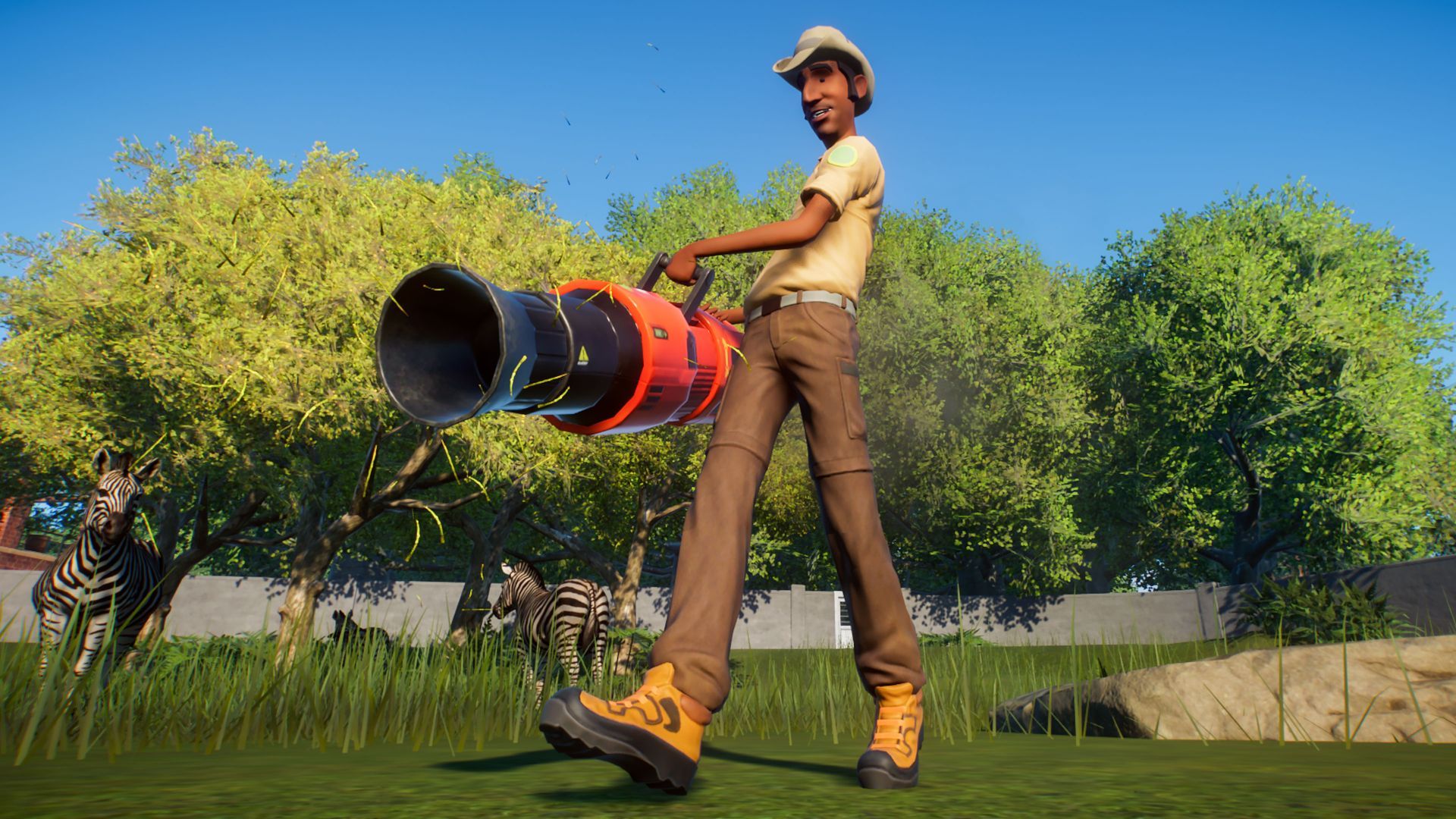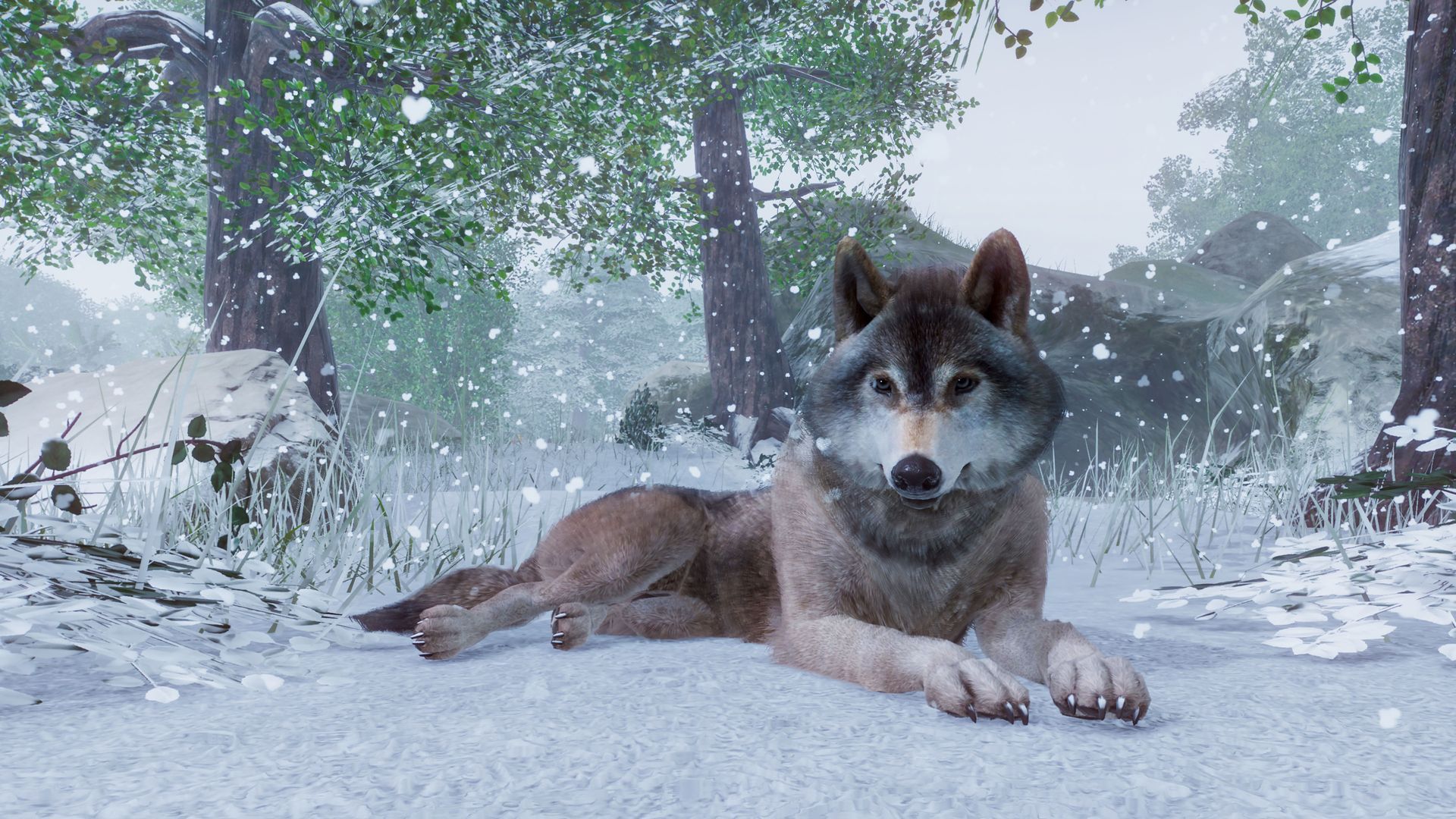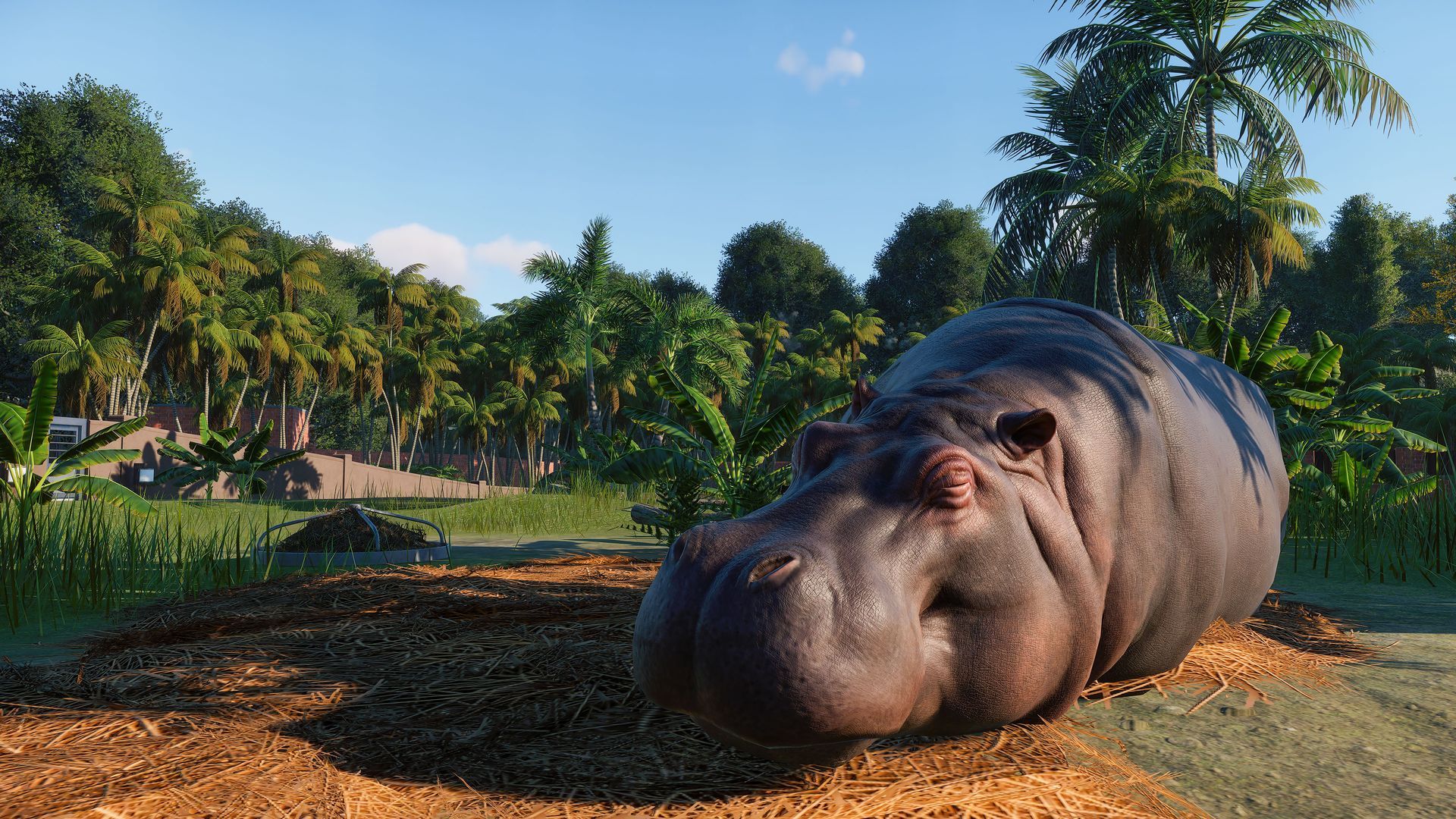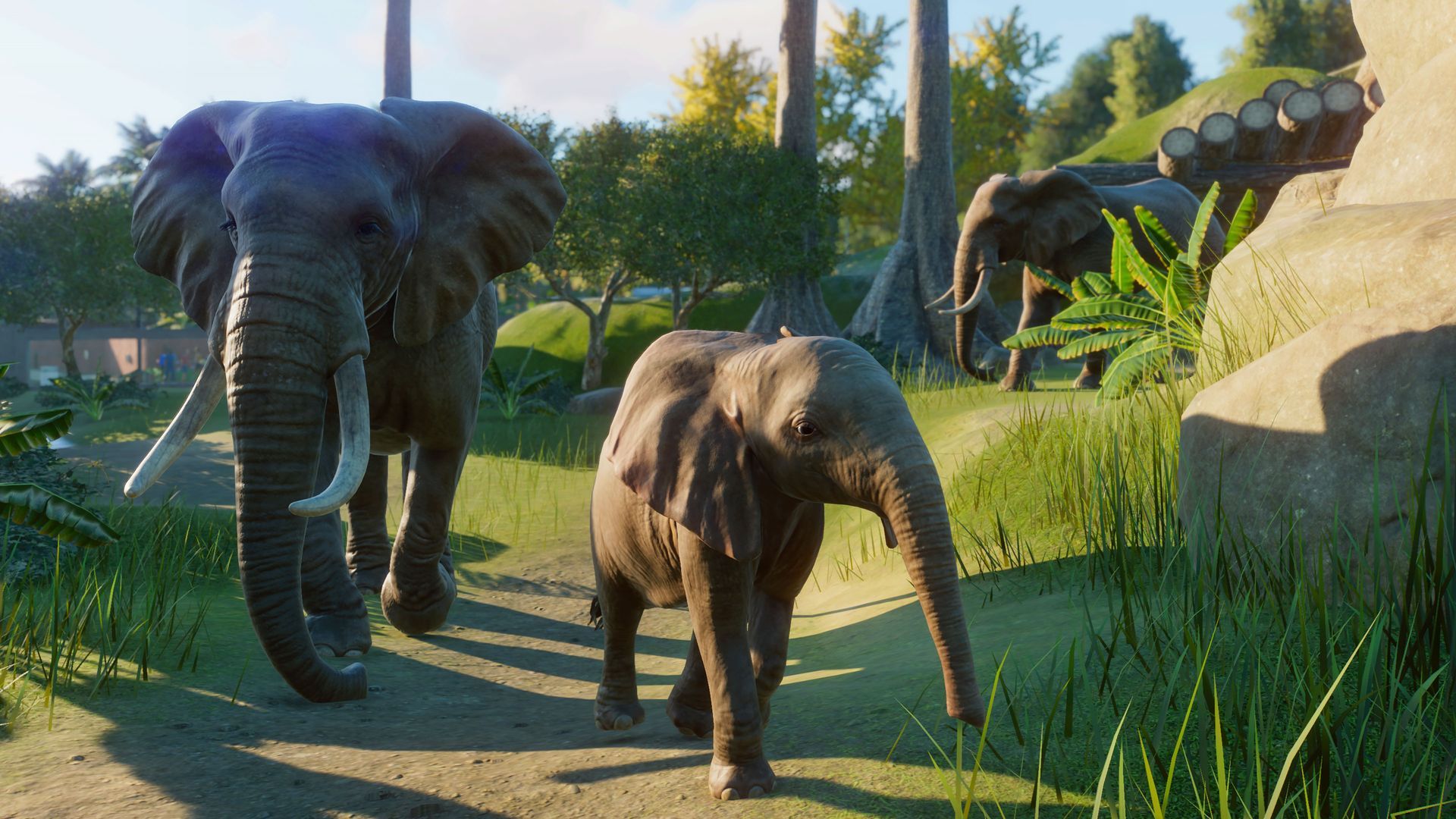New Planet Zoo tech lets you build a parkour paradise for Chimpanzees
Breeding, guest education, and procedural chimp motion bring Planet Zoo to life.

Edinburgh Zoo is famous for its penguin parade. At 2:15 each day, punters step off the paths to make way for the King, Gentoo and Rockhopper birds, who march on by the exhibits with their wings stretched out at their sides, as if left in the default t-pose by an animator. Except for the times when nothing happens. The parade runs on a voluntary basis, and some days the penguins don't feel like it. It's the accepted cost of running a park ethically.
The Planet Zoo team has faced similar issues practicing its E3 demo. Sometimes, when the camera sweeps over the Serengeti-inspired safari park they've built for the occasion, the crocodiles drift languidly across the water in photogenic fashion. But just as often they stay in bed. And occasionally, a reticulated giraffe interrupts a monologue about the flexibility and depth of the game's building toolkit to plop a big pile of stools in close-up. If nothing else, it's a fine demonstration of Frontier's physics at its smallest scale, as brown lumps jostle and thud to find their final positions in the dirt below.
"We are working with live animals here," senior developer Liesa Bauwens says. "They're pretty much impossible to script."
Thankfully, there are places where the behavioural simulation at the conservationist heart of Planet Zoo turns out to be a perfect showcase for its creative tools, too. Take the western chimpanzees, whose high intelligence makes them demanding residents, just as you or I would be if asked to spend a chunk of our lives in an enclosure. I'm told they hop up onto nearby trees—though on the day I'm visiting, they aren't in the mood.
Park life
A smart way to meet their enrichment needs is to install a climbing frame. As befits a semi-sequel to Planet Coaster, these frames are marriages of function and form that can be built any which way, and can become ambitious creative projects if you so choose. The walls and roofs of nearby buildings can be co-opted as part of their structure, and the chimps will clamber all over these player-defined walkways as if they've always been there. "It's no boast to say that the technology behind the locomotion system is cutting edge," Bauwens says. "Nobody's doing anything like this, and it's extremely difficult."
The procedural chimp parkour is the result of over a year's work by a team of coders. If that seems excessive, it reflects Frontier's determination to fold the creative potential of the Planet games back into its management side. It's a welcome push: while Planet Coaster was a strong simulator and a near-boundless creative tool, it could sometimes feel as if those two parts belonged to different games. There were few in-game incentives to spend hours perfecting the aesthetics of a ride—a separation that Planet Zoo's focus on animal enrichment means to correct. "Your animals will be walking, swimming and climbing over player-defined surfaces," Bauwens says, "making your creativity part of the gameplay."
Yet there's been no compromise to the depth of the tools on offer. Every part of your park environment can be constructed one asset at a time, like a coaster. "It's an expression of creativity as precise as you want to make it," Bauwens says.
Keep up to date with the most important stories and the best deals, as picked by the PC Gamer team.
Clearly Planet Zoo's title, toothy guests and creative tools link it firmly to Planet Coaster. But it wears the influence of Frontier's more recent Jurassic World: Evolution, too, like a shaggy mane. Its attention is pointed inward, at the stats and needs of your attractions, rather than those of the humans who ogle them.
Yes, balancing the books by keeping your guests happy—and spending—is a part of the equation, lending tension and strategy to the process of building out each park in a way that can satisfy both visitors and inhabitants. But your mission on maps like these is to conserve local animals until you can release them into the wild, and it's the welfare of your animals you'll spend the majority of your time worrying about.
A little local knowledge will go a long way in that regard. Splash on recreating the habitat of the plains zebra, for instance, and you may as well chuck in a few black wildebeest as well. The two animals coexist in the wild, relying on their complementary behaviours to detect predators, which means they both get an enrichment bonus for their proximity. And, hey, your guests won't complain about the extra variety.
Sourcing the exhibits is one area in which Planet Zoo departs from its prehistoric predecessor. Turns out real-world animals—just another conservational tidbit for you here—aren't made by researching special rocks you find at dig sites. Instead, when a mummy springbok and a daddy springbok love each other very much, they share their genetic traits. Each of the game's animals are genetically unique, and these genes determine not only the patterns in their fur, but their size, immunities, fertility, and ultimately the length of their lives. "We follow our animals' complete lifecycle from birth to death," Bauwens says, "leaving space for both celebration and mourning."
Inbreeding can compromise good traits, and so sorting your animals into the right social groups to rear their young becomes another layer of management. It's a matter of self-education, and it extends to the guests too. In a first for Frontier's many management games, you're no longer merely appealing to base desires—for food, drink, and well-situated toilet facilities—but also a desire to learn. Guests want to understand the animals they've come to see, and you can cater to that new need for knowledge with well-placed information signs, which can be improved through research.
Creatures of habit
While you're nominally in charge of the operation, Planet Zoo knows you want exactly what those guests do. Whether behind a pane of glass or a monitor, we all want to ogle the animals. This is a game as much about watching as interacting, and it plays to that strength.
There's a kind of mindfulness to be found in sitting and watching your park unfold—enjoying the gentle huff of a bear breathing through its nose, or the ASMR scritch of a playful lion digging its claws into a post. But there's practical worth in bearing quiet witness to your park as well.
In Planet Coaster you could determine the effectiveness of your pathing just by looking at the flow of the crowds below, noting the eddies and stagnant pools of people. Here in Planet Zoo, the subtle animations and AI of the animals alert you to their illnesses, frustrations, and deficiencies. Frontier wants management to be visual wherever possible—a radical undertaking when the genre has so often buried us in menus.
"All of these things are a massive undertaking," Bauwens says. "When we combine the complex animal AI, new staff systems, guest behaviors and a large economic rebalance, all these factors contribute to Planet Zoo being a standalone game."
It's testament to Planet Zoo that I hadn't even considered it as an expansion until that possibility was mentioned. Not only is it stuffed with new systems, but it's a philosophically different game to Planet Coaster—empathetic, serene, and powered by a fierce drive to educate. It more than justifies its own enclosure.
Jeremy Peel is an award-nominated freelance journalist who has been writing and editing for PC Gamer over the past several years. His greatest success during that period was a pandemic article called "Every type of Fall Guy, classified", which kept the lights on at PCG for at least a week. He’s rested on his laurels ever since, indulging his love for ultra-deep, story-driven simulations by submitting monthly interviews with the designers behind Fallout, Dishonored and Deus Ex. He's also written columns on the likes of Jalopy, the ramshackle car game. You can find him on Patreon as The Peel Perspective.




